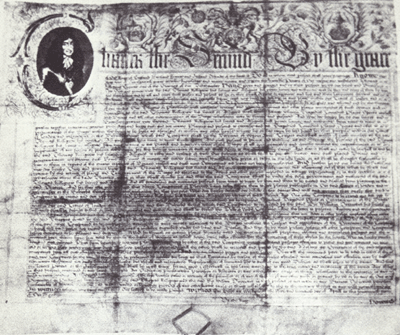
|
Thomas Killigrew was one of the most notable and prestigious theatre owners of his time. He owned the first theater to appear on Drury Lane and, after building his reputation, served as theater manager to Charles II. Sir William D'avenant was another rising theatre owner as well as a playwright himself. The competition that ensued between the two men brought about much scandal and notoriety amidst theatre culture. D'avenant too wanted fame and success. He relished being appointed the Governor of the king and queen's company of actors performing at the infamous Cockpit Theatre at Drury Lane. Not to be outdone, Killigrew developed a patent (named after himself of course) that claimed he should be the man to run all the theatre in England. In the spirit of true competition, D'avenant comprised one himself though his held less authority. [1] Pictured here is an authentic image of the Killigrew Patent. |
 |
This escalating conflict, however, did not undermine each owner's prestige. Actors at the time only had potential to rise to great success if selected to star in either Killigrew or D'avenant's company. The two men finally put tension aside and merged their strengths together to create a united company. Their first production opened at the Cockpit Theatre. The company held much fame and domination over the English Theater but it was by no means a monopoly. In fact, the two owners encountered competition even when working together. For example, Sir Henry brought up a lawsuit, particularly against D'avenant for performing Sir Henry's plays. [2] This type of controversy brought a great deal of attention to theare culture and made people more interested in its happenings.
Both Killigrew and D'avenant instilled the importance of theatre in their children. As a result, the sons of these men, both named Charles, carried on the lineage of theatre managing in the late 17th century. Killigrew inherited not only his father's business skills but his pretention as well. He did not like to compromise with the actors in his company and took great measures to maintain his prestigious status. He comprised a group known as "The Master Partners" including other theatre entrepeneurs such as Philip Griffin, Cardell Goodman, and Killigrew's half-brother, Henry. [3] In time, the D'avenant family gained more recognition and held dominion over English theatre. The D'avenant Patent gained authority and the Drury Lane company, owned by Killigrew, diminished. Several new owners began to emerge towards the turn of the century such as Owen Swiney. Theatre in the early 1700's suffered a lull period because the plays were unexperimental and uninteresting to audiences. The late 1720's and early 1730's reversed this situation as theatrical activity climbed to its greatest apex. The numbers of theatregoers increased as the plays' content grew more heated and controversial. The court had previously distanced itself from the theatre; however, at this time, many middle-class puritans as well as the royal Sir Robert Walpole found distaste in the corrupt values that satirical comedy conveyed. [4] The result of this disatisfaction reached a climax with the Licensing Act of 1737. This act limited the opening of new theatres and the two patent houses held a monopoly over English theatre. This act added a new structural component to theatre culture with precise guidelines and procedures and made it less of a free for all.
Click here to read the Licensing Act of 1737!
